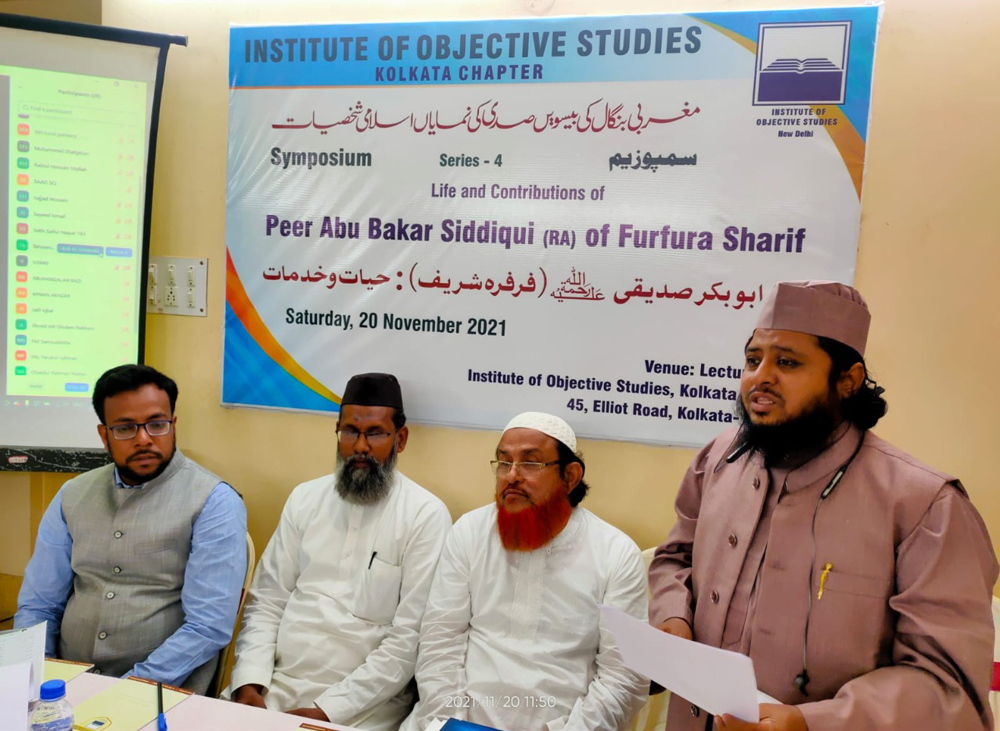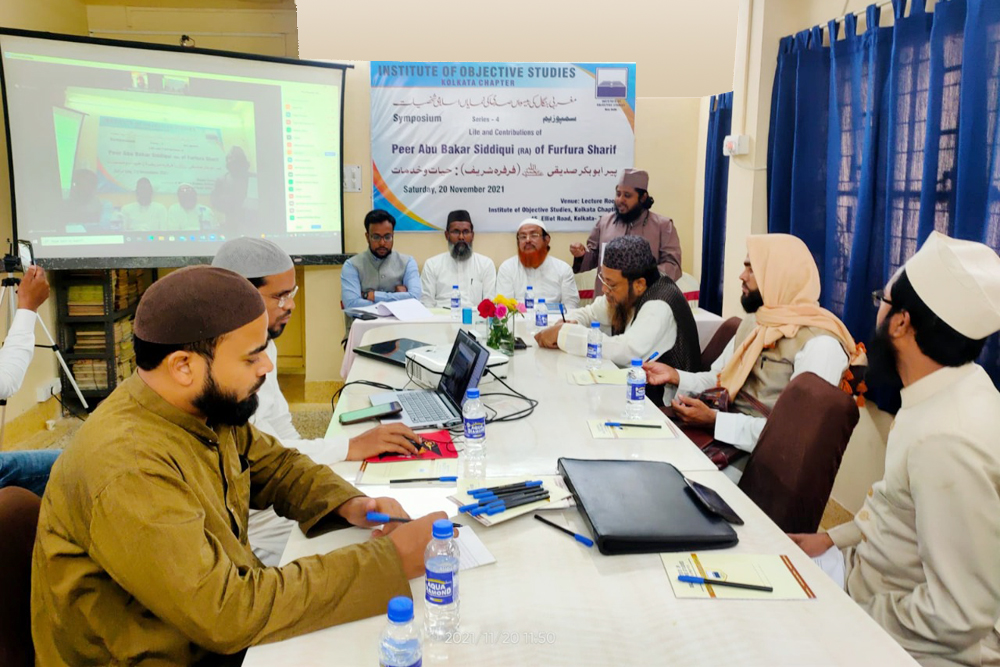IOS Kolkata Chapter organises Symposium on “Life and Contributions of Peer Abu Bakr Siddiqui (r.a.) of Furfura”

An online-offline international symposium was organised on the life and contributions of Peer Abu Bakar Siddiqui (r.a.) – a great preacher and highly influential social and religious reformer of West Bengal, also known as Mujadded-e-Zaman, on November 20, 2021 by the Kolkata Chapter of the Institute of Objective Studies at Kolkata.
Kolkata Chapter of the IOS has been organising a series of symposiums under the theme “Remembering the 20th Century Islamic Scholars of West Bengal“. This symposium was the fourth in the series. Well-researched papers and lectures were presented by scholars on different aspects of the life of Peer Abu Bakar Siddiqui (r.a.).
The symposium was presided over by Syed Md Bahauddin, President, Shah Abu Bakar Siddique Memorial Committee, Furfura Sharif of West Bengal with Sk. Noor Mohammad Nadvi, Office Secretary - Rabita Adab e Islami Aalami, Kolkata, performing the role of the anchor. Among the notable scholars who presented their papers and thoughts were Dr Obaidur Rahman Nadvi, faculty member, Darul Uloom Nadwatul Ulama, Lucknow; Mufti Munirul Islam, Shaikhul Hadith, Madrasa Anwarul Uloom Darul Hadith, Bangladesh; Dr Mizanur Rahman Kazi, faculty member, Department of Islamic Theology, Aliah University, Kolkata; Mr Saifuddin Nadvi, director, ASGM Mission, 24 Praganas; Mr Sobaan Siddiqui, Islamic scholar; and Mr Khurshid Alam Nadvi, Islamic Scholar.

Mr Abdul Basit Ismail, Coordinator of IOS Kolkata Chapter, in his welcome speech, familiarised the audience about the academic activities and the contribution of the Institute of Objective Studies under the able leadership of its chairman, Dr Mohammad Manzoor Alam. Mr Ismail elaborated on the purpose of organising the series of symposiums under the theme “Remembering the 20th Century Islamic Scholars of West Bengal“. He reiterated the words of the Chairman, IOS, that today's generation need to be aware of our previous generations’ scholars’ lives and their services. We cannot succeed unless we pay respect to our scholars and pass on their values to the new generation.
The scholars presented their well-researched papers in Bengali, Urdu and Arabic that will be published in a compiled book on the theme. Syed Md Bahauddin, President-Shah Abu Bakar Siddique Memorial Committee, Furfura Sharif of West Bengal, in his presidential remarks, appreciated the initiative of the Kolkata Chapter.
Peer Abu Bakr Siddiqui was born on 18th March 1846 at the village of Furfura Sharif under the Jangipara Block in the Hooghly district of present West Bengal. He received his elementary education at the local primary school in the village and later joined Sitapur Endowment Madrasah and Hooghly Mohsenia Madrasah (one of the oldest madrasahs in Bengal, named after the famous philanthropist Haji Mohmmad Mohasin) for higher education, where he completed the degree ‘Jamiet-ul-Ula’. He later moved to Calcutta and studied Quran, Hadith, Tafsir, Fiqh, Faraiz from the famous Islamic scholars Maulana Syed Ahmed Shahid and Hafez Maulana Jamaluddin. He went to Madina Manawwarah (Saudi Arabia) and mastered the knowledge of Hadith under the guidance of Maulana Syed Ameer Rezwan.
Peer Abu Bakr Siddique received the Bateni (spiritual) knowledge from his Pir-o-Murshid (Sufi master) Shah Sufi Syed Fateh Ali Waisi, based in Kolkata. He mastered the knowledge of four major Sufi orders such as Mujaddedia, Nakshebandia, Chistia, Qaderia under the guidance of his spiritual master, Shah Sufi Syed Fateh Ali Waisi. He was the founder of the Silsila-e-Furfura Sharif (order of Furfura Sharif), which is one of the most influential Sufi religious networks among the Bengali Muslims. An educationalist and philanthropist, Peer Abu Bakr Siddique is also known as a great social and religious reformer of 20th century Bengal. He is remembered as “Mujaddid-” (Reformer) among his followers. He established numerous educational institutions throughout Bengal.
He was vocal about the problems of dowry, oppression of poor agricultural workers by Zamindars (landlords), female education, the importance of the girl child, rights of women in Islam, advocating for modern scientific and technical education, etc. The socio-religious reforms by him had certainly shaped and transformed the identity of the Bengali Muslim community from the pure religio-cultural category to the religio-political community.
He breathed his last on 17th March 1939, leaving behind his unparalleled legacy.
The important highlights of the symposium were:
- Peer Abu Bakr is the most important and notable personality who dedicatedly worked for the reforms of Bengali Muslims when they were disconnected from their religion and involved in un-Islamic culture and lifestyle in the late 19th and early 20th centuries.
- He was not only a peer but a social reformer, educationist, Islamic Scholar, Faqeeh, teacher, writer, orator, Muhaddis, and a philanthropist.
- His role in the religious reform movement in Bengal is commendable. He can also be termed as the Sir Syed of Bengal.
- He still has his followers in Bengal, Bangladesh, Bihar, Meghalaya, Assam, Tripura etc.
- His sons and grandsons are still successfully continuing the cause and must be supported.
- Peer Abu Bakr was the famous Khalifa of Sufi Fatah Ali who was the Khalifa of Sufi Noor Muhammad who was the Khalifa of Syed Ahmed Shaheed (r.a.). Thus, it can be said that Peer Abu Bakr was busy furthering the great movement in Bengal, which led Syed Ahmed Shaheed (r.a.).
- He was a great scholar, and under him, the spiritual Islam propagated largely.
- He established hundreds of Masjids and educational centers in Bengal.
- He was the first Bengali scholar who pointed out and openly spoke about the inaccurate hadiths (Around 450 Hadith).
- The great personality of Peer Abu Bakr needs to be introduced to the young generation and also to the Urdu-speaking Islamic scholars of the country.
- He should be presented as a great Bengali Muslim personality to the world.
Press Coverage...
Go Back